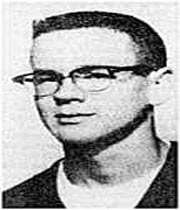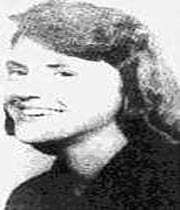Today in History: Clutter Family Murdered (1959)
In Cold Blood is a 1965 book by American author Truman Capote.
It details the 1959 slaying of Herbert Clutter, a wealthy farmer from Holcomb, Kansas, his wife, and two children.
When Capote learned of the quadruple murders before the killers were captured, he decided to travel to Kansas and write about the crime. Bringing his childhood friend and fellow author Harper Lee (To Kill a Mockingbird) along, together they interviewed local residents and investigators assigned to the case and took thousands of pages of notes. The killers, Richard "Dick" Hickock and Perry Smith, were arrested not long after the murders, and Capote ultimately spent six years working on the book. It is considered the originator of the non-fiction novel and the forerunner of the New Journalism movement.
The story weaves a complicated psychological story of two parolees who together commit a mass murder, an act they were not capable of individually. Capote's book also details the lives of the victims and the effect the crime had on where they lived. A large part of the story involves the dynamic psychological relationship of the two felons that culminated in this senseless crime. In Cold Blood is often regarded as a pioneering work of true crime.
Overview of crime
Herbert Clutter was a dedicated Methodist and a widely respected self-made man who had established a successful farm from modest beginnings. He employed as many as eighteen farm hands, and former employees reportedly admired and respected him for his fair treatment and good wages. His four children, three girls and a boy, were widely respected in the community. The two eldest, Eveanna and Beverly, had moved out of their parents home and started their adult lives. The two younger children, Nancy (age 16) and Kenyon (15), were high school students still living at home. Clutter's wife, Bonnie, a member of the local garden club, had been incapacitated with depression and physical ailments since the births of her children, although this characterization of her has been disputed by surviving family members.
Two ex-convicts on parole from the Kansas State Penitentiary, Richard "Dick" Hickock and Perry Edward Smith, committed the robbery and murders on November 15, 1959. Richard Hickock had heard from a fellow prisoner, Floyd Wells, who had once worked for the Clutters, that there was a safe at the ranch where Herb Clutter kept large amounts of cash. Hickock later contacted Smith about committing the robbery with him. Hickock hatched the idea in prison to commit the robbery, leave no witnesses and start a new life in Mexico with the cash from the Clutter home. Hickock described his plan as "a cinch, the Perfect score." The information proved to be false, since Herb Clutter did not keep cash on hand, had no safe, and did all his business using checks.

After driving across the state of Kansas on Saturday, November 14, 1959 and discovering that there was no money to be found at the Clutters' home, Smith slit Herb Clutter's throat and then shot him in the head. As Smith recounted later, "I didn't want to harm the man. I thought he was a very nice gentleman. Soft spoken. I thought so right up to the moment I cut his throat."What happened next is uncertain, but first Kenyon, then Nancy, and then Bonnie were murdered, each by single shotgun blast to the head.
Smith claimed in his oral confession that Hickock murdered the two women. When asked to sign his confession, however, Smith refused. He wanted to accept responsibility for all four killings because he said he was "sorry for Dick's mother." Smith added, "She's a real sweet person."Hickock always maintained that Smith did all four killings.
Hickock and Smith were ultimately arrested in Las Vegas about six weeks after the murders. They pleaded temporary insanity during the trial, but local GPs evaluated the accused and pronounced them sane. After five years on death row, Smith and Hickock were executed by hanging just after midnight on April 14, 1965 in Lansing, Kansas at the Kansas State Penitentiary (now known as Lansing Correctional Facility). The gallows from which they were hanged is now part of the collections of the Kansas State Historical Society. Capote's researchOn November 16, 1959, the New York Times published the following account of the murders.
Holcomb, Kan., Nov. 15 [1959] (UPI) -- A wealthy wheat farmer, his wife and their two young children were found shot to death today in their home. They had been killed by shotgun blasts at close range after being bound and gagged ... There were no signs of a struggle, and nothing had been stolen. The telephone lines had been cut.
—The New York Times

This 300-word article interested Capote enough for him to travel to Kansas to investigate the murders. Capote brought his childhood friend Harper Lee, who would later win the Pulitzer Prize for Fiction for her novel To Kill a Mockingbird, with him to help gain the confidence of the locals, who distrusted Capote. After the criminals were found, tried, and convicted, Capote held personal interviews with both Smith and Hickock. Smith especially fascinated Capote; in the book he is portrayed as the more sensitive and guilt-ridden of the two killers. Rumors of a romantic and even sexual relationship, mainly due to Capote's homosexuality, are still suggested to this day. The book was not completed until after Smith and Hickock were executed. AdaptationsThe book itself was made into a 1967 film of the same name by Richard Brooks, who directed and adapted the screenplay. It starred Robert Blake as Perry Smith and Scott Wilson as Richard Hickock. It was nominated for four Academy Awards: Best Director, Best Original Score, Best Cinematography and Best Adapted Screenplay. The film was also adapted into a 1996 miniseries starring Anthony Edwards and Eric Roberts.
Capote's experiences in writing the story, and his subsequent fascination with the murders, has been adapted into two films. Capote (2005) starred Philip Seymour Hoffman, who won the Academy Award for Best Actor for his portrayal of Truman Capote, and Catherine Keener as Harper Lee. The film was critically acclaimed and was nominated for four other Oscars, including Best Picture, Best Supporting Actress (Keener), Best Director (Bennett Miller), and Best Adapted Screenplay (Dan Futterman). A year later the film Infamous, starring Toby Jones as Capote and Sandra Bullock as Lee, was released to favorable reviews.
Source: encyclopedia.thefreedictionary.com
Other Links:
Hanno The Elephant
Hannibal Lecter
Desiderius Erasmus